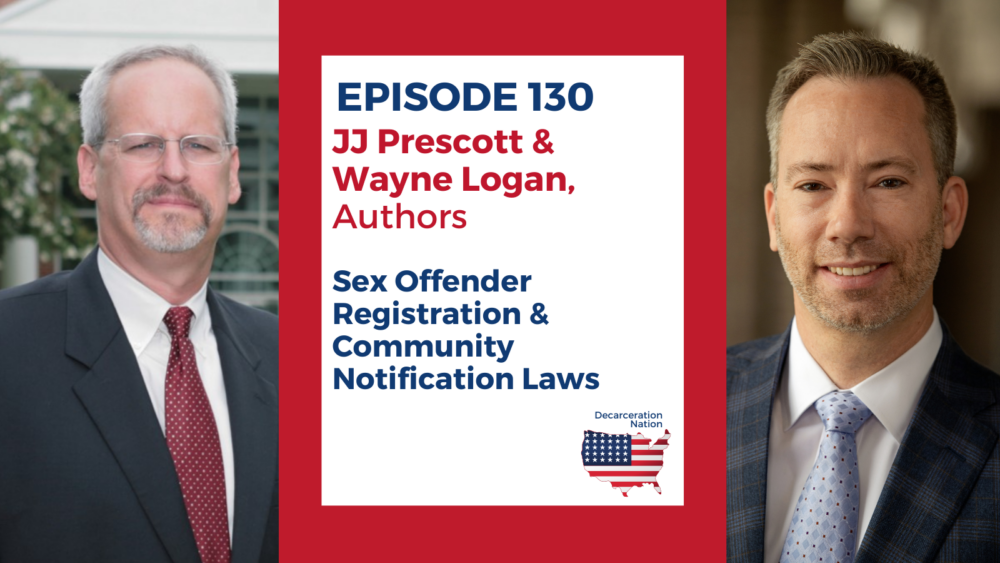Josh interviews Marc Levin of the Texas Public Policy Foundation and Right on Crime at the Smart on Crime Innovations Conference 2019.
Full Episode
Preview
My Guest – Marc Levin

Marc A Levin is vice president of criminal justice at the Texas Public Policy Foundation and Right on Crime. An attorney and accomplished author on legal and public policy issues, Marc began the Foundation’s criminal justice program in 2005. This work contributed to nationally praised policy changes that have been followed by dramatic declines in crime and incarceration in Texas.
Transcript
A full PDF transcript of Episode 66 of the Decarceration Nation Podcast.
Notes from Episode 66
We were invited to the third annual Smart on Crime Innovations Conference 2019. The conference was held in New York City on September 24th and 25th. Any sound from the conference was courtesy of the Center for American Progress, John Jay College of Criminal Justice, and the Draper Richards Kaplan Foundation.
The third voice you hear in the interviews is our web guru Robert Alvarez who was able to join me at the conference.

Decarceration Nation is a podcast about radically re-imagining America’s criminal justice system. If you enjoy the podcast we hope you will subscribe and leave a rating or review on iTunes. We will try to answer all honest questions or comments that are left on this site. We hope fans will help support Decarceration Nation by supporting us from Patreon.



Two recent reports on supervising people in the community post-conviction deserve Grits readers’ attention: From the Texas Public Policy Foundation, Marc Levin has a 10-point agenda on parole that’s more aggressive than any decarceration proposal that conservative group has promoted before. Meanwhile, the Council of State Governments issued an analysis of the proportion of prison admissions related to revoked probation and parole terms. Let’s look at the CSG report first, since it provides the lay of the land. They have state-specific pages for each jurisdiction; here’s the one for Texas. By their calculations, 47 percent of people entering Texas prisons in 2017 were revoked either from probation or parole – 36 percent from probation, 11 percent from parole. My first thought was to double-check their math, so here’s my calculations using verifiable, public sourcing. In Texas, according to an annual TDCJ report to the legislature, probation revocations to prison in FY 2017 totaled 23,101; of that, 11,522 were for technical violations. In FY 2017, according to the Board of Pardons and Paroles’ Annual Statistical Report, 6,555 parolees were revoked; of those, 1,043 were for technical violations. Combined, that’s 29,656 people revoked from probation and parole combined in 2017; 12,565 of those were for technical violations only. TDCJ admitted 65,278 total people that year, according to the TDCJ Annual Statistical Report. So, by my math, that’s 45% of TDCJ admissions from probation and parole revocations, not 47%, with 19% coming from technical violations alone. (According to their methodology appendix, they had trouble coming up with data on technical probation violations, which may account for some of the disparity.) But that’s nitpicking. The authors’ point was to demonstrate that nearly half of prison admissions arise from supervision revocations, not new convictions. That is certainly true, which brings us to Marc Levin’s TPPF policy brief on parole. Whereas CSG aimed to identify the scope of the problem, Levin proposes reforms to reduce unnecessary supervision and revocations. In Mr. Levin’s ideal world, prisons would begin planning for reentry soon after a person is incarcerated and make sure all necessary treatment and programming has been completed by the time they’re first eligible for parole. Moreover, he would have the parole board mainly assess risk to the public going forward, emphasizing behavior while in prison and participation in programming. By contrast, in Texas, one of the most common reasons for denial of parole is “nature of the offense,” which cannot ever change. He touts a Michigan statute, in particular, which limits the reasons parole can be denied to 11, mostly public-safety oriented items. (The references in this document are a treasure trove.) Levin wants to ensure parole conditions are manageable and adjusted based on risk level, with lower-risk people receiving less supervision. He wants prisoners to get credit for “earned time,” which in Texas is optional for the parole board to recognize (this provides scant incentive for program participation, cooperation on work details, etc.). He would reduce barriers to employment for parolees and stop the use of regressive zoning practices to restrict where parolees can live. (January Advisors just did a major analysis on this topic focused on Houston .) Levin wants to alter how parole officers are evaluated, focusing on recidivism reduction. And finally, he wants some reentry duties currently performed by the justice system to be performed by nonprofits and other entities, which incidentally is what happened recently in Colorado with its community reinvestment program. I’m glad to see people thinking more deeply both about how to measure the community-supervision elements of mass incarceration as well as how to better utilize those tools for reducing prison populations and preventing recidivism. Taken together, these two documents reaffirm many of the findings in an analysis published last year from the Columbia University Justice Lab titled, ” Too Big to Succeed ” (which also has informative footnotes), that gave recommendations for cutting the size of community corrections systems in half.